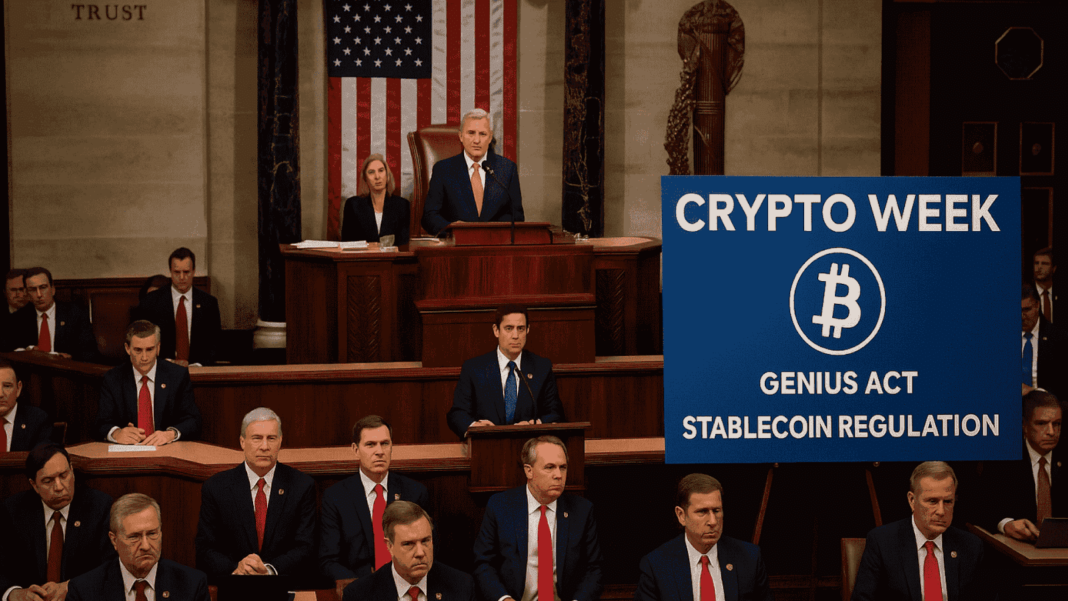In a significant legislative push, US Republican lawmakers have laid out their next major agenda: a series of initiatives dubbed “Crypto Week”, which includes the long-anticipated GENIUS Act and new stablecoin regulations. The move signals an aggressive attempt to advance the crypto regulatory framework and solidify America’s role in the evolving digital asset economy.
The Focus of Crypto Week
Set to unfold over several days in Washington, Crypto Week will bring various industry-backed bills to the forefront of Congressional discussions. Key among them is the introduction of the GENIUS Act, a legislative proposal aimed at fostering innovation in blockchain technology while setting clear compliance rules for digital asset providers.
The week will also cover discussions around stablecoin legislation, which has been under scrutiny for months. Lawmakers are expected to propose stricter guidelines for stablecoin issuers, including mandatory reserves, transparency measures, and operational audits. These measures are designed to ensure that stablecoins maintain their peg to fiat currencies and can withstand market volatility.
Driving Factors Behind the Initiative
Republican leaders argue that the United States must create a competitive and predictable environment for digital asset innovation. With countries like the United Kingdom, Singapore, and Switzerland advancing their regulatory frameworks, US lawmakers feel increasing pressure to catch up and retain the nation’s technological edge.
House Financial Services Committee Chair Patrick McHenry emphasized the importance of bipartisan cooperation in shaping responsible regulation that supports both innovation and consumer protection. He noted that without regulatory clarity, many crypto firms might shift operations overseas, risking job losses and economic setbacks.
Industry Support and Lobbying Efforts
The crypto industry’s response to Crypto Week has been largely supportive. Major industry groups and blockchain advocacy organizations have been lobbying in favor of the proposed bills, viewing them as essential for driving institutional investment and public trust.
Several prominent crypto exchanges and financial firms are backing the GENIUS Act, highlighting its provisions for regulatory sandboxes and research incentives. These measures are designed to allow emerging projects to experiment under regulatory supervision, fostering innovation while minimizing systemic risks.
Stablecoin issuers, including major players in the market, are also showing cautious support. They acknowledge the need for standardized regulations to ensure long-term stability and broader adoption.
Potential Economic Implications
If the proposed legislation passes, it could have wide-ranging implications for the US economy. Clearer rules for crypto businesses could lead to increased investment in blockchain startups and fintech ventures.
Furthermore, the regulatory clarity might attract traditional financial institutions to deepen their involvement in digital assets, potentially accelerating the integration of cryptocurrencies into mainstream financial products and services.
On the other hand, some analysts caution that overly restrictive measures could stifle innovation and limit competition. They advocate for a balanced approach that fosters growth while safeguarding against misuse.
Global Attention on US Crypto Policies
As one of the world’s largest financial markets, the US plays a critical role in shaping global crypto policy trends. International observers are closely watching Crypto Week, as its outcomes may influence regulatory approaches in other jurisdictions.
Countries grappling with similar regulatory questions may look to the US as a model for balancing market development with risk mitigation. US lawmakers’ ability to reach a consensus on crypto issues could set a precedent for global cooperation on digital asset governance.
Challenges and Political Dynamics
Despite the momentum behind Crypto Week, political hurdles remain. Some Democrats have expressed concerns over certain provisions in the GENIUS Act, particularly those related to tax treatment and data privacy.
Moreover, differing views on stablecoin regulation could slow progress, as policymakers debate the appropriate level of government oversight. Disagreements over the extent of central bank involvement and the role of private issuers may prolong negotiations.
Nevertheless, proponents of Crypto Week remain optimistic. They believe that bipartisan dialogue and the urgent need for regulatory clarity will ultimately drive legislative action.
Outlook for the Future
As Crypto Week approaches, the digital asset industry and the broader financial community are bracing for potentially transformative changes. Whether the legislation passes in its current form or undergoes modifications, the effort marks a critical step in the United States’ evolving stance on digital assets.
Market participants, legal experts, and technology developers will be closely monitoring developments, as the decisions made during Crypto Week could reshape the trajectory of crypto innovation and regulation for years to come.
In this pivotal moment, US lawmakers face a delicate balancing act: crafting policies that safeguard consumers and the financial system while nurturing one of the most dynamic sectors of the global economy.


